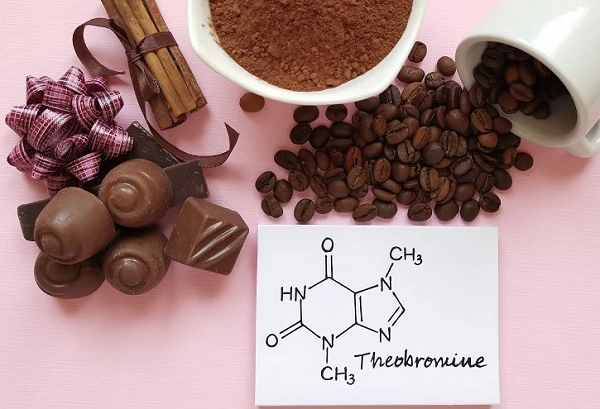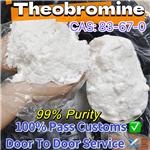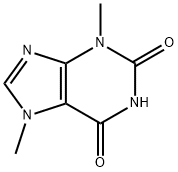Theobromine: the Benefits and side effects
Introduction
Theobromine is abundant in methylxanthine, which is present in nature and is part of a group of compounds, alkaloids. This bioactive molecule could be found in functional foods like cacao, guaraná, and teas.

Theobromine was isolated from the seeds of the cacao tree and then shortly afterwards was synthesized from xanthine by Fischer. Theobromine is the primary bitter-tasting alkaloid found in cocoa and chocolate; chocolate contains 0.5–2.7% theobromine. Theobromine is water-insoluble and is an isomer of theophylline as well as paraxanthine. Theobromine is categorized as 3,7-dimethylxanthine, while theophylline is 1,3-dimethyl-7H-purine-2,6-dione, and paraxanthine is 1,7-dimethylxanthine. Theophylline is known to be a bitter-tasting principle of green tea. Theobromine is used as a vasodilator (a blood vessel widener), as an aid in urination, and as a heart stimulant. Although the theobromine content in chocolate is small enough to be safely consumed by humans, it is reported that animals such as dogs metabolize theobromine more slowly and may succumb to theobromine poisoning.
Benefits
Theobromine is responsible for many important biological proprieties, such as antioxidant and anti-inflammatory, influencing in a positive way the moods, ensuring the welfare and state of alertness[1].
Theobromine also presents an important antitumor activity against many types of cancers. In this sense, Sugimoto et al. (2014) performed an in vitro study to analyze the antitumor effect of theobromine on human glioblastoma cells. The results indicated that this bioactive molecule is capable of decreasing cell growth by inhibiting growth factors.
Moreover, a recent study reported that theobromine was able to increase the action of doxorubicin and decrease cell cancer resistance in CRC cells (Volo). This study performed by Środa-Pomianek et al. (2019) suggested that theobromine could decrease tumour resistance by increasing the response of doxorubicin and decreasing cell proliferation CRC (Volo), which is recognized for its high resistance to chemotherapy and difficult treatment. Another study also carried out in this area showed that epigallocatechin, a flavonoid found in great concentration in cocoa, was able to potentiate the action of cisplatin in lung cancer cells by decreasing cell proliferation (A549).
Also, a previous study revealed that theobromine derivative MQS-14 was able to induce the death of gastric cancer cells MGC-803, SGC-7901, and HGC-27 by reactive oxygen species (ROS) pathways. The results showed that theobromine derivative MQS-14 reduced the cell viability of MGC-803 cells and generated cell cycle arrest. In addition, MQS-14 increased cellular ROS levels and stimulated the mitogen-activated protein kinase (MAPK) pathway, followed by decreased p-ERK and increased p-JNK (c-Jun N-terminal kinase) expression. MGC-803 cells presented DNA damage followed by apoptosis after the treatment with MQS-14.
The toxicity in a dog

Although it is not a common clinical problem, theobromine toxicity in dogs can be life-threatening when it occurs. The dog is unusually sensitive to the physiological effects of theobromine when compared with other species. This sensitivity appears to be the result of a lower rate of theobromine metabolism, resulting in a longer half-life in the bloodstream and tissues. After a single dose, the half-life of theobromine in the plasma of adult dogs is approximately 17.5 hours. In comparison, theobromine’s half-life in human subjects is 6 hours; in rats, it is only 3 hours. It has been theorized that the extended half-life in dogs may potentiate acute toxicity reactions to theobromine after the consumption of foods containing chocolate[2].
Dogs having theobromine toxicity experience vomiting, diarrhea, panting, restlessness, increased urination or urinary incontinence, and muscle tremors. These signs usually occur about 4 to 5 hours after the dog has consumed the food containing chocolate. The onset of generalized motor seizures signifies a poor prognosis in most cases and often results in death. Theobromine toxicity is treated by inducing vomiting as soon as possible. An activated charcoal “shake” given by gastric lavage may aid in decreasing the quantity of the drug that is absorbed into the bloodstream. Unfortunately, there is no specific systemic antidote for theobromine poisoning.
Although few controlled studies on the level of theobromine that constitutes a toxic dose have been conducted in dogs, data from long-term studies and case reports indicate that toxicity can occur when a dog consumes a dose of 90 to 100 mg/kg of body weight or more. Factors such as individual sensitivity to theobromine, mode of theobromine administration, presence of other foods in the gastrointestinal tract at the time of ingestion, and variations in theobromine content between chocolate products cause wide variations in the susceptibility of individual dogs to chocolate poisoning. Chocolate products differ significantly in theobromine content and, therefore, in their ability to produce theobromine poisoning.
References:
[1] CADONá F, MACHADO A, BODENSTEIN D, et al. Natural product–based nanomedicine: polymeric nanoparticles as delivery cargoes of food bioactives and nutraceuticals for anticancer purposes[C]. 1900. DOI:10.1016/b978-0-12-819666-3.00002-x.[2] CASE L, DARISTOTLE L, HAYEK M, et al. Common Nutrition Myths and Feeding Practices[C]. 1900. DOI:10.1016/b978-0-323-06619-8.10026-x.
You may like
See also
Lastest Price from Theobromine manufacturers

US $0.00/kg2025-05-07
- CAS:
- 83-67-0
- Min. Order:
- 1kg
- Purity:
- 0.99
- Supply Ability:
- 1000kg

US $90.00/kg2025-04-21
- CAS:
- 83-67-0
- Min. Order:
- 1kg
- Purity:
- 99% Purity (What/sapp: +86 18145728414)
- Supply Ability:
- 1000 Tons/Month


